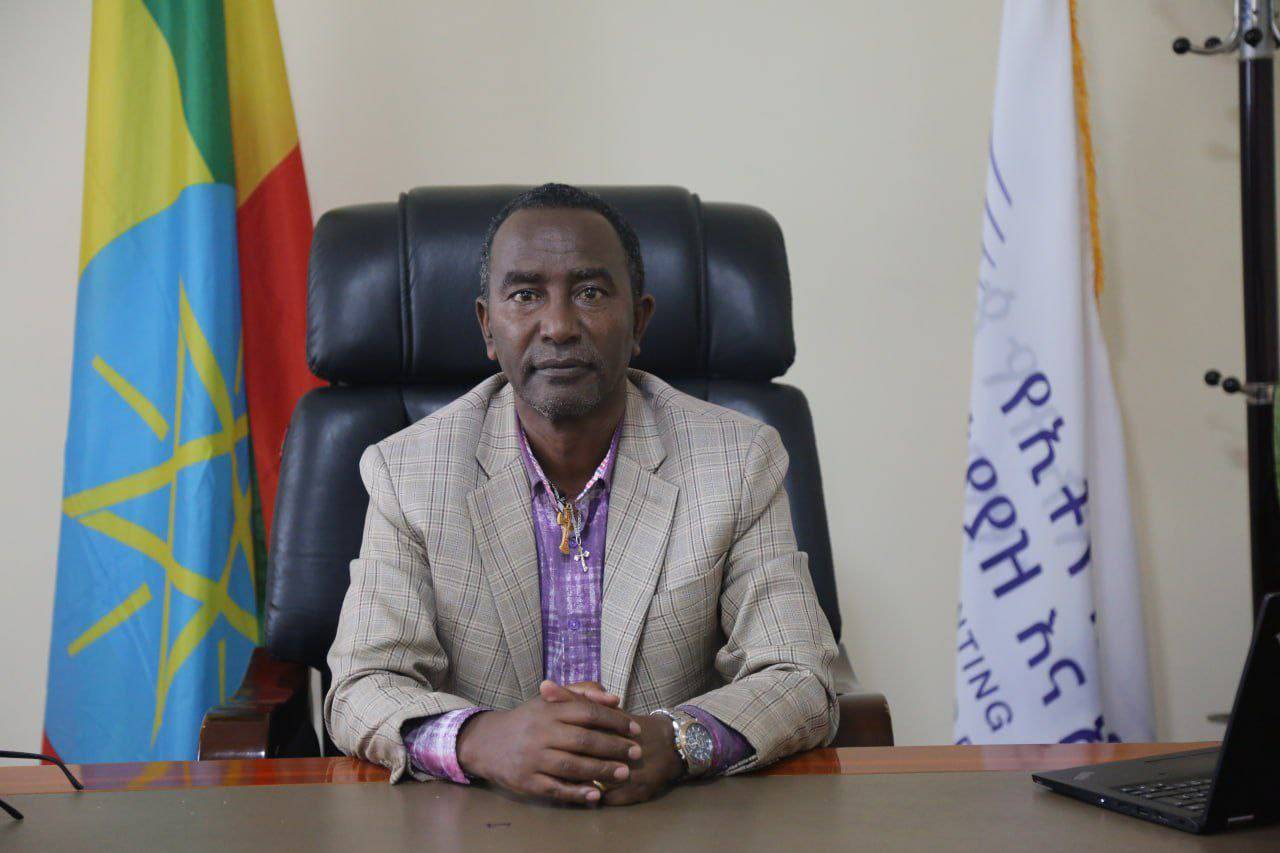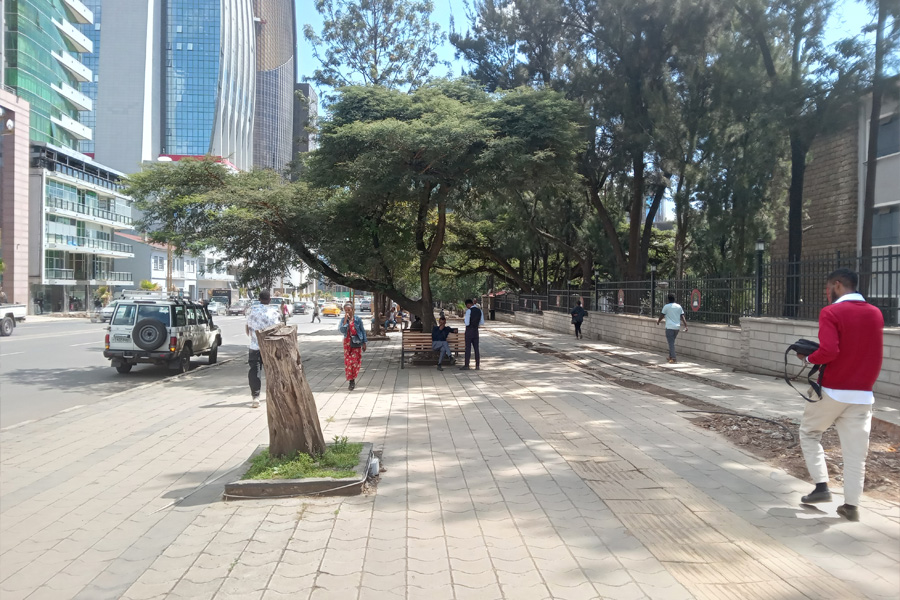
The start of the new year has injected a sense of optimism into the banking industry, driven by expectations of increased remittance inflows and the promise of reforms liberalising the foreign exchange market. Commercial banks, long starved of foreign currency, now see the potential for securing much-needed hard currency, a development that could impact their operations.
At the Sky-Light Hotel last week, the atmosphere was charged with anticipation as bankers gathered to display their enhanced remittance services to Mamo Mihretu, governor of the National Bank of Ethiopia (NBE). Tables were set with brochures and digital displays, designed to impress. Bank executives eagerly awaited their opportunity to showcase their financial performance and services.
Oromia Bank was one of these; its President, Teferi Mekonnen, enthusiastically spoke about his bank’s evolving services and financial offerings. According to Teferi, improvements in deposits and liquidity were prompted by reforms that had redirected the flow of remittances from the parallel market.
“They're speculating,” said Teferi, referring to people still reluctant to convert their forex, waiting to see if the Birr would depreciate further.
The Birr has depreciated by over 100pc against the U.S. dollar, particularly in the days following the central bank’s decision to float the currency in July 2024. As part of a broader economic policy reform agreed with the IMF, the liberalisation of the forex market was intended to close the gap in the value of the Birr between the official and parallel markets. The authorities believe the value of the Birr, free from distortions and speculations, could boost exports and attract foreign direct investments (FDI).
The authorities also hoped remittances and other transfers from non-governmental organisations would reach nearly five percent of Ethiopia’s GDP. They outlined plans to unify the exchange rate and remove restrictions on current accounts to reduce costs and constrain the use of informal transfer methods.
However, the policy shift has led to high volatility, igniting anxiety in the market over inflation and triggering an economic reckoning. Yet, some of the commercial banks' senior executives remain hopeful that the changes will help stabilise the market.
Teferi revealed Oromia Bank's a strategic initiative designed to lure customers away from informal channels by offering "secure and rewarding" options. The Bank offers customers loans with an 80pc ratio, provided they deposit at least 20pc of their savings in foreign currency.
"This would encourage investment, directing more money through formal channels," he said.
Data from the central bank reveals that remittances (close to six billion dollars) account for 76pc of total foreign exchange transfers. According to the World Bank, such forex sources play crucial role in supporting developing economies. In 2023, remittance flows to low and middle-income countries were estimated at 656 billion dollars, with 54 billion dollars coming from sub-Saharan Africa. Remittance, funds migrants send to their relatives in the home country, can improve the living conditions of those in the receiving end.
The disparity between the official and parallel market exchange rates doubled before the policy shift, as so many opted for informal methods to send money home. Ethiopia has received over 15 billion dollars in remittances in the last three years, with Ethiopians in North America claiming 30pc share. Asia followed them at 29pc, Europe (23pc), and Africa (18.6pc). However, a substantial portion of these funds bypassed official banking channels.
Governor Mamo blamed what he called a "distorted market" for keeping remittance inflows down, noting that the gap between official and parallel market rates had once been as wide as 100pc. According to him, the disparity had contributed to increased capital flight and depleted foreign exchange reserves. However, he sounded optimistic about the impact of the foreign exchange market reforms, attributing a narrowing of the gap to four percent in the past month to the new policies. He warned of administrative measures against those using unofficial channels to send and receive remittances, promising consequences for violators.
“Strict measures will be taken against those who trespass,” he said.
The Governor also revealed that the central bank has been closely monitoring commercial banks’ foreign exchange operations through its auction system, implying that it has helped stabilise the currency market.
According to Yenehasab Tadesse, NBE's director of Foreign Exchange Monitoring & Reserve Management, the recent foreign currency directive is expected to improve remittance channels by allowing residents and non-residents to negotiate interest rates for deposits and conversion.
“It’s important to create an attractive market for investors,” Yenehasab told Fortune, signalling the need for a more competitive environment to boost remittance flows.
Teferi, alongside other bankers, echoes the official optimism about the reforms. However, challenges remain, particularly in ensuring cash liquidity.
Despite the enthusiasm surrounding the reforms, problems loom large. Cash liquidity in Birr remains a concern, and the volatility in the foreign exchange market has yet to subside fully. Banks would need to contend with the deeply entrenched informal market, which continues to draw a substantial share of remittances. Yet, the central bank’s efforts, mainly introducing the unite.et platform and licensing foreign exchange bureaus, could prove crucial in redirecting flows through formal channels.
According to Sidama Bank’s President, Tadesse Hatiya, remittance inflows have grown by 60pc in recent months, and he attributes the rise to the reforms. He remains upbeat that the changes will lead to a long-term increase in foreign currency reserves, though he acknowledges liquidity constraints persist.
Eshetu Fantaye, a banking industry veteran who now works as a consultant, drew parallels to other countries, noting that similar strategies have been successful in India, Bangladesh, and Pakistan. However, he cautioned that Ethiopia's policymakers should carefully monitor remittance corridors and market demand to ensure success. He also pointed to the upcoming holiday season as an opportunity to determine whether remittance flows can be entirely redirected through formal channels.
“Policymakers should not underestimate the informal market,” he warned, urging the need for user-friendly systems that make it easier for the diaspora to send money home through official channels.
Central bank officials have already moved aggressively to do this, launching the "Debo Campaign," a six-month awareness initiative encouraging the Ethiopian diaspora to use formal banking channels. During the campaign’s launch last week at the Skylight Hotel, on Africa Avenue (Bole Raod), Governor Mamo stressed the importance of remittance to the economy, citing its role in boosting foreign exchange reserves, increasing investment, and reducing poverty.
“It’s a critical contribution to the country,” he said.
The central bank has also unveiled a 100 billion Br loan program designed to finance housing and investment projects for individuals sending remittances through official channels. The initiative, which onboards all 31 commercial banks, is expected to further bolster remittance inflows.
The NBE also disclosed its plan to streamline foreign currency inflows by introducing a new digital platform, "unite.et," allowing Ethiopian residents and non-residents to open foreign currency accounts remotely. According to Yonas Yirga, head of marketing operations at Awash Bank, the largest private bank, they have already crafted a digital platform to integrate with the system.
“We're optimistic that remittance flows will continue to rise,” Yonas told Fortune, disclosing the bank’s offerings and new incentives, including a loan program similar to Oromia Bank’s.
The NBE is now considering applications to permit remittance flows through licensed foreign exchange bureaus, a move expected to be implemented in the next few weeks. These bureaus will be required to obtain foreign exchange business licenses from the Ministry of Trade & Regional Integration (MoTRI).
For an Ethiopian who works overseas, her experience of using unofficial channels to send money back home was the norm. She left for Germany seven years ago and has since become an IT professional, regularly sending substantial sums to her family. Frustrated by the unfavourable exchange rates at banks, she resorted to informal channels, despite the risks. She finds someone willing to transfer the money at higher rates than the official market offered and reimburses them with the equivalent amount in euros.
“Everyone did this,” she conceded, hoping the recent reforms could make official channels more attractive. “I’d prefer to use a secure way if the disparity in exchange rates is marginal."
PUBLISHED ON
Sep 08,2024 [ VOL
25 , NO
1271]

In-Picture | Jul 14,2025

Viewpoints | Oct 20,2024

Editorial | Dec 30,2023

Radar |

Fortune News | Sep 21,2025

My Opinion | Jun 28,2025

Letter To Editor | Aug 19,2024

Radar | Nov 03,2024

In-Picture | Nov 16,2024

Exclusive Interviews | Aug 04,2024

Dec 22 , 2024 . By TIZITA SHEWAFERAW
Charged with transforming colossal state-owned enterprises into modern and competitiv...

Aug 18 , 2024 . By AKSAH ITALO
Although predictable Yonas Zerihun's job in the ride-hailing service is not immune to...

Jul 28 , 2024 . By TIZITA SHEWAFERAW
Unhabitual, perhaps too many, Samuel Gebreyohannes, 38, used to occasionally enjoy a couple of beers at breakfast. However, he recently swit...

Jul 13 , 2024 . By AKSAH ITALO
Investors who rely on tractors, trucks, and field vehicles for commuting, transporting commodities, and f...

Oct 4 , 2025
Eyob Tekalegn (PhD) had been in the Governor's chair for only weeks when, on Septembe...

Sep 27 , 2025
Four years into an experiment with “shock therapy” in education, the national moo...

Sep 20 , 2025
Getachew Reda's return to the national stage was always going to stir attention. Once...

Sep 13 , 2025
At its launch in Nairobi two years ago, the Africa Climate Summit was billed as the f...